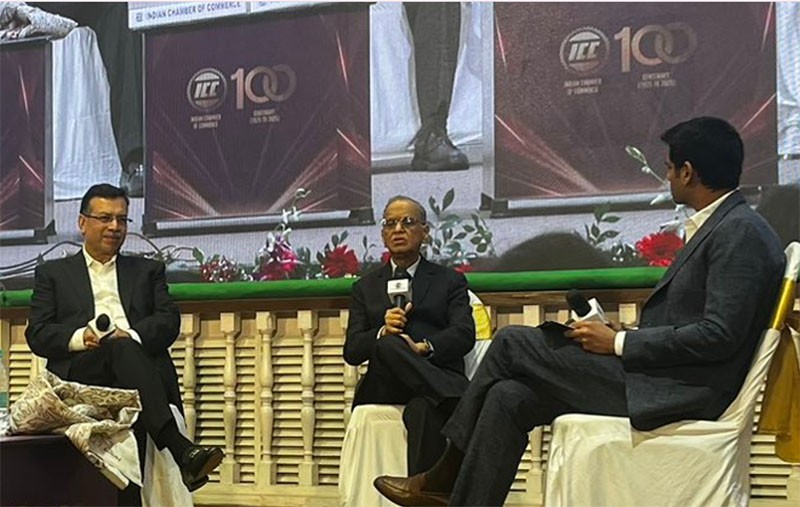
'We have to work hard to make India no. 1': Infosys co-founder Narayana Murthy defends his ‘70-hour work week’ again
Kolkata: Infosys co-founder NR Narayana Murthy defended his ‘70-hour work week’ remark at an event in Kolkata, emphasizing its importance in making India a global leader, according to an NDTV report.
Speaking at the Indian Chamber of Commerce centenary launch, Murthy reiterated the need for hard work, saying, "We have to work hard and work towards making India number one." He addressed criticism of his comment, stressing that Infosys has always aimed to match global standards.
“Once we compare ourselves with the best global companies, I can tell you we Indians have a lot to do,” Murthy said.
Murthy highlighted the urgency of setting high aspirations, pointing out that 800 million Indians receive free rations, reflecting that a chunk of the Indian population is still poor. “If we are not in a position to work hard, then who will work hard?" he questioned.
Recounting his time in France during the 1970s, Murthy shared how the West viewed India as “corrupt and filthy.”
Observing the prosperity, efficiency, and infrastructure in Western countries, he contrasted it with India’s “roads with potholes” and lack of development at the time.
It was a time when Jawaharlal Nehru was the Prime Minister and the Indian Institutes of Technology were being established. "At the time and we were all sold on Nehru and socialism," he said.
Inspired to address India’s challenges, Murthy sought answers from the French Communist Party leader but found the responses unsatisfactory.
"I realised the only way a country can fight poverty is by creating jobs that lead to disposable incomes. The government has absolutely no role in entrepreneurship. I also realised entrepreneurs build a nation as they create jobs, they create wealth for their investors, and they pay taxes,” Murthy explained.
Murthy advocated for "compassionate capitalism," combining the benefits of capitalism with the generosity inherent in India’s 4,000-year-old culture.
“In a poor country like India where capitalism had not taken roots, I realised if I had to come back and experiment in entrepreneurship, then we have to embrace compassionate capitalism," he said.
"I am very proud of the culture of our country... Embrace compassionate capitalism. It is practising capitalism while combining it with the best aspects of liberalism and socialism so that this country stands steadily as a stellar example of capitalism," Murthy added.
He stressed the importance of hard work in elevating India’s global standing.
He remarked, "Human beings can think and express. When God has given us this ability, it behoves us to think about people less fortunate than us. It is to make sure that the rest of the world respects India.
"Performance leads to recognition, recognition leads to respect, respect leads to power. I wanted youngsters to know that we have a greater responsibility to fulfil the vision of our founding fathers."
Murthy highlighted the productivity gap between and Indian and a Chinese worker to assert his point.
He maintained that Indians should work hard, raise productivity rather than staying “comfortable”.
"A gentleman here told me a Chinese worker is 3.5 times more productive than an Indian. It is very easy for us to write all kinds of nonsense and remain wretched, filthy and poor and shunned by the world. Therefore, I don't think we should say we are all comfortable and I will not go to the office. My request to all the people assembled here is to dedicate their lives to realising their value," Murthy added.
Support Our Journalism
We cannot do without you.. your contribution supports unbiased journalism
IBNS is not driven by any ism- not wokeism, not racism, not skewed secularism, not hyper right-wing or left liberal ideals, nor by any hardline religious beliefs or hyper nationalism. We want to serve you good old objective news, as they are. We do not judge or preach. We let people decide for themselves. We only try to present factual and well-sourced news.







